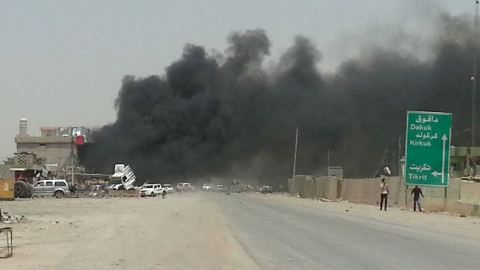More than three years ago, revolts broke out in several Arab countries against their authoritarian regimes. The revolts were often dubbed variously as either the “Arab Spring” or the “Arab Awakening.” Both phrases anticipated the establishment of democratic regimes in those countries.
But almost immediately the leaders of the radical Shiite regime of the Islamic Republic of Iran rejected this terminology. It was to be sure an awakening but an “Islamic Awakening.” It was an awakening that represented the triumphant culmination of the 20th-century movement known as Islamism, often known as political Islam for its ambition to bring religion into a leading political role in the Muslim world and thereby revive Muslim political fortunes. As such, it was an awakening that Tehran welcomed. Indeed, they claimed that it was an awakening that Iran had itself inspired through its own revolution of 1979 and the radical Shiite Islamist regime that they had built. Down to the present they have continued to advance that interpretation.
Events since have partially confirmed the Iranian view, albeit in ways some of which they may not have anticipated and certainly cannot fully welcome. Initially, the evidence consisted of the early electoral success in several countries of the parties of the Muslim Brotherhood, the oldest Sunni Islamist organization. But at present the most dramatic and significant development to emerge from the Arab revolts has been the military success of the organization heretofore known as the Islamic State of Iraq and the Levant (ISIL).
Recently, it made good on the transnational claim its name bore, a claim deeply important to the radical Sunni Islamist movement from which it emerged. It achieved the conquest of most of Sunni Iraq and directly joined those lands to the Syrian territory it has captured during the Syrian civil war. It crowned those achievements first by renaming itself the “Islamic State” and then by declaring that it had reestablished the Islamic Caliphate, an institution whose last formal existence ended in 1924.
Thus the Islamic State agrees with Iran that what is afoot is an Islamic Awakening. But its own version is implacably hostile to Shiism. Describing its further ambitions in Iraq, its spokesman, Abu Mohammed al-Adnani, declared, “We need to settle our differences with you [the Shia]. These differences go back a long way. We will settle our differences not [merely] in Baghdad but in Kerbela, the filth-ridden city, and in Najaf, the city of polytheism.” These two cities are home to the tombs of Imams Ali and Hussein, the two most important Shiite shrines, not only for Iraqi Shiites, but Shiites everywhere. Thus the terms of Al-Adnani’s declaration were meant to denounce Shiite belief as such, as well as to threaten the destruction of these shrines.
The present success of the Islamic State confirms that the Islamic Awakening is not only a crucial reality but a two-fold one. It is a tale of two revivals in mortal combat with each another. Inasmuch as the Sunni and Shiite combatants espouse their own specific theological/political agendas, not all Sunnis and Shiites are on board. But the combatants can’t help but try to bring them in. And it is becoming harder and harder for them to resist. As a result, the Greater Middle East is drawing closer to a still broader and deeper sectarian conflict.
Iran retains the ambition to lay claim to leadership of the Islamic Awakening and unite the Muslim world. To this end, it denounces the Islamic State and other groups like it as “takfiris” and mere terrorists. Iran claims the movement lacks Islamic authenticity and as such must be the product of infidel conspiracies designed to divide Muslims. The main culprits are the United States, other Western countries, and the “Zionists.” This is of course ludicrous especially coming from Iran, universally regarded as the world’s greatest state sponsor of terrorism.
But it does point to the great difficulty America faces in the new environment. For that is presently defined by the conflict between two terrorist and sectarian states, both of which are implacably hostile to the US. The victories of either against the other will not enhance American security and interests.
What is America to do? In the past, America took no side in sectarian disputes. It had no principled reason to do so and still doesn’t. It acted within the existing framework of nation states and allied with countries that have shared interests if not principles. This course would still be appropriate but is now complicated by two things: the de facto partition of several countries, and our neglect of existing allies. The latter needs to be reversed with vigor; the former may provide the United States with new potential allies, most notably the Kurdish Regional Government of northern Iraq. We have typically sided against them in their struggles with the Baghdad government. This should stop.
But the most immediate necessity is to avoid the temptation to side, even by default, with the Islamic Republic. This temptation has been created by Iran’s denunciation of the Islamic State as terrorist and President Obama’s overwhelming focus on the fight against terrorism. Terrorist the Islamic State surely is. But unless this is our only interest in the Middle East, and perhaps even if it is, Iran presents a greater threat especially as it moves to acquire nuclear weapons.




















